Intrinsic Vs Extrinsic Motivation: Similarities And Differences
Intrinsic motivation stems from engaging in activities for personal satisfaction or interest, driven by factors like curiosity and autonomy. Intrinsic motivation is fostered by fulfilling the needs for autonomy, competence, and relatedness, encouraging engagement through meaningful and supportive environments. Intrinsic motivation enhances long-term engagement, personal fulfillment, and deeper learning by aligning activities with individual interests and internal satisfaction. Intrinsic motivation offers sustained drive, higher satisfaction, creativity, and resilience while reducing stress and reliance on external factors.
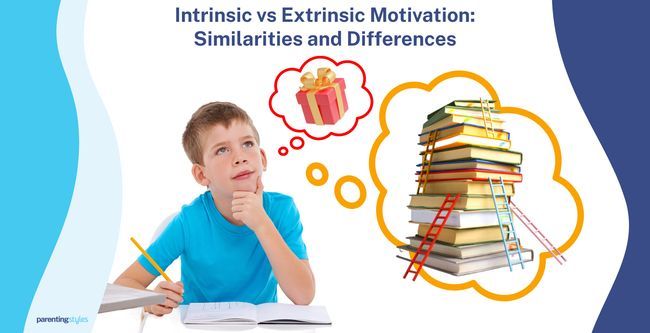
Extrinsic motivation involves performing tasks for external rewards or outcomes, such as tangible incentives or social recognition. Extrinsic motivation operates through rewards and punishments, shaping behavior via external consequences. Extrinsic motivation aims to initiate action when the intrinsic drive is lacking, complementing intrinsic motivation in certain contexts. Extrinsic motivation supports goal achievement, particularly for tasks lacking personal interest, by utilizing rewards to drive behavior. Extrinsic motivation activates behavior quickly, establishes measurable goals, and encourages compliance in structured environments.
Both motivations drive behavior, interact synergistically, and require effective management to sustain engagement over time. Intrinsic motivation focuses on process and internal satisfaction, while extrinsic motivation centers on external rewards and short-term outcomes. Effective strategies include encouraging curiosity, setting achievable goals, and encouraging effort.
What Is Intrinsic Motivation?
Intrinsic motivation is the internal drive to engage in an activity because the process is enjoyable, interesting, or satisfying. Behaviors driven by intrinsic motivation occur without the influence of external factors such as rewards or punishment. Factors often associated with intrinsic motivation include curiosity, challenge, control, and context, according to a 2017 study titled “Self-Determination Theory: Intrinsic Motivation and Behavioral Change” by Marie Flannery and published in Oncology Nursing Forum. Self-motivation develops when a task or situation satisfies people’s interests and needs for challenges. Offering tasks aligned with personal goals and providing freedom to choose strengthens intrinsic motivation. For example, a musician practicing an instrument for the sheer joy of making music is driven by intrinsic motivation.
How Does Intrinsic Motivation Work?
Intrinsic motivation works when the three basic psychological needs of autonomy, competence, and relatedness are satisfied, according to a 2020 study titled “Intrinsic and extrinsic motivation from a self-determination theory perspective: Definitions, theory, practices, and future directions,” conducted by Richard M. Ryan et al. and published in Contemporary Educational Psychology.
Environments that promote freedom of choice and instill confidence encourage individuals to feel capable of completing tasks without external rewards. For example, offering a child the option to wash dishes or fold clothes helps them feel trusted and capable. The approach encourages the child to take the initiative and help around the house over time, without needing reminders from other household members.
Competence refers to the need to feel effective and capable. Competence supports intrinsic motivation by cultivating a sense of achievement and mastery. For example, a workplace that provides employees with meaningful challenges, constructive feedback, and opportunities to develop skills promotes a sense of competence. Employees experience a sense of fulfillment when they master the new skills and complete the tasks, motivating them to continue performing.
Relatedness refers to the sense of connection or bond individuals feel with others. Relatedness supports intrinsic motivation by creating an environment where individuals feel understood, supported, and valued, enhancing their willingness to engage in activities for inherent satisfaction. People who participate in neighborhood clean-up feel connected to their neighbors and a desire to contribute to the community’s well-being. The shared effort to improve the area creates unity, motivating individuals to remain engaged in future initiatives.
What Is The Importance Of Intrinsic Motivation?
The importance of intrinsic motivation is its ability to drive behavior from within. Intrinsic motivation propels individuals to engage in activities for their own sake, without external rewards or pressures.
Understanding intrinsic motivation helps create environments that encourage genuine interest. Educators who recognize the importance of self-determined behavior create more engaging and stimulating learning experiences. Cultivating intrinsic motivation inspires students to become lifelong learners, even beyond the classroom. Employees become encouraged to be productive without the influence of external rewards.
Understanding the factors that drive intrinsic motivation helps children harness their potential and achieve greater personal fulfillment. Children become engaged in deep learning, exploring topics with curiosity and passion, as noted in a 2000 study titled “Intrinsic and Extrinsic Motivations: Classic Definitions and New Directions,” conducted by Richard M. Ryan and Edward L. Deci and published in Contemporary Educational Psychology.
What Are The Advantages Of Intrinsic Compared To Extrinsic Motivation?
The advantages of intrinsic motivation compared to extrinsic motivation include more sustainable drive, higher satisfaction, and enhanced creativity. The advantages of intrinsic motivation over extrinsic motivation are listed below.
- More Sustainable Drive: Intrinsic motivation persists longer than extrinsic motivation. The long-term effects of intrinsic motivation are evident in school performance and nonacademic settings, such as music practice and substance abuse treatment, according to a 2019 study titled “Do Both Intrinsic and Identified Motivations Have Long-Term Effects?” conducted by Yuan Liu et al. and published in The Journal of Psychology.
- Higher Satisfaction: Tasks driven by intrinsic motivation often yield higher personal satisfaction. Enjoying the process rather than focusing on outcomes creates a deeper sense of accomplishment and fulfillment.
- Enhanced Creativity: Intrinsic motivation encourages creativity and exploration. Individuals are free to experiment without fear of losing rewards. Self-motivation allows individuals to focus on quality and novel solutions.
- Higher Quality Learning: Intrinsic motivation offers an advantage over extrinsic motivation by promoting deeper engagement with learning. Children who study out of genuine interest in a topic develop better cognitive processes, including more expansive reasoning and the creation of vivid mental images.
- Perseverance: intrinsic motivation generates the determination and satisfaction needed to continue pursuing goals long-term. Achieving a sense of personal accomplishment supports the development of necessary skills and effort for persevering in challenges.
- Resilience and Adaptability: Intrinsically motivated people tend to persist through challenges and setbacks because they find the activity itself rewarding. Such individuals adapt better to changes. Their motivation isn’t dependent on external validation or incentives.
- Lower Stress and Anxiety: Activities driven by intrinsic motivation reduce stress. These activities align with personal interests and are inherently rewarding. Intrinsically driven activities are not tied to high stakes or conditional rewards that tend to induce anxiety.
- Personality Development: Intrinsic motivation encourages people to explore and reflect on their interests, which leads to personal growth. Pursuing interests helps individuals learn new things and adapt to challenges, while self-reflection nurtures understanding and wisdom.
- Better Development: Pursuing inherent interests plays a key role in developing cognitive, social, and physical abilities, according to a 2000 study titled “Intrinsic and Extrinsic Motivations: Classic Definitions and New Directions,” conducted by Richard M. Ryan and Edward L. Deci and published in Contemporary Educational Psychology. Intrinsic motivation satisfies innate psychological needs for competence and autonomy, further enhancing well-being.
- Reduced Dependence on External Factors: Intrinsic motivation does not rely on external validation or incentives. There is no risk of demotivation when external rewards are removed. Intrinsically motivated individuals are more self-reliant.
- Support for Psychological Treatments: Patients undergoing substance abuse rehabilitation programs have better outcomes when intrinsically motivated, according to a 2019 study titled “Intrinsic Motivation and Psychological Connectedness to Drug Abuse and Rehabilitation: The Perspective of Self-Determination,” conducted by Gloria H. Y. Chan et al. and published in the International Journal of Environmental Research and Public Health. Self-efficacy in overcoming addiction promotes better mental health, resulting in better treatment outcomes.
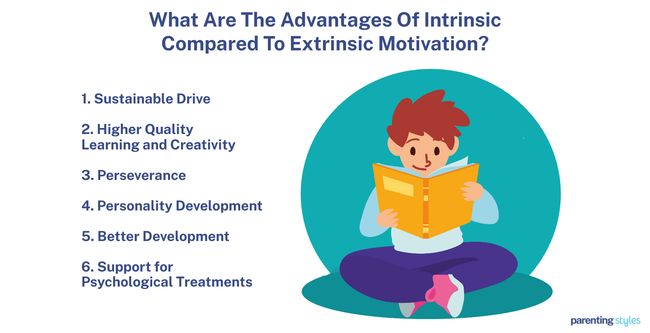
What Is Extrinsic Motivation?
Extrinsic motivation is the drive to do an activity due to external factors or obtain a separable outcome. Individuals driven by extrinsic motivation do things for tangible or intangible rewards instead of enjoyment or self-satisfaction. A child cleaning up toys to get candies is an example.
Extrinsic motivation develops through rewards or punishments. Individuals perform activities either to gain incentives like money, food, and gifts or to avoid negative consequences such as pressure or discrimination, according to a 2022 study titled “On what motivates us: a detailed review of intrinsic v. extrinsic motivation,” conducted by Laurel S. Morris et al. and published in Psychological Medicine journal.
There are two types of rewards related to extrinsic motivation, tangible and intangible rewards. Tangible rewards include physical items given to encourage or reinforce desired behaviors. Intangible rewards include social recognition, positive interactions, or other’s approval.
How Does Extrinsic Motivation Work?
Extrinsic motivation works through operant conditioning, a psychological concept proposed by B. F. Skinner. Operant conditioning states that behaviors are shaped by consequences. Rewards increase the likelihood of a behavior, while punishment reduces recurrence.
Extrinsic motivation operates similarly by encouraging people to work on a task in exchange for attaining a separable outcome, according to a 2021 study titled “Behaviorism as External Stimuli: Improving Student Extrinsic Motivation through Behavioral Responses in Algerian College Education,” conducted by Dr. Maroua Rogti and published in Global Journal of Human-Social Science: G Linguistics & Education. For example, completing homework on time allows a child to earn stickers for effort and avoid losing recess time for missing an assignment.
What Is The Purpose Of Extrinsic Motivation?
The purpose of extrinsic motivation is to shape behavior when intrinsic motivation is lacking. Extrinsic motivators serve as substitutes for internal drive, pushing people to act in ways that are considered unappealing. For example, monetary incentives encourage employees to complete a boring and difficult task.
Extrinsic motivation aims to create a synergistic effect when an individual is already intrinsically motivated. Relational rewards like praise, recognition, and feedback interact positively with intrinsic motivation, significantly enhancing creative and innovative performance, according to a 2019 study titled “The Influence of Intrinsic Motivation and Synergistic Extrinsic Motivators on Creativity and Innovation,” conducted by Carmen Fischer et al. and published in Frontiers in Psychology.
What Is The Importance Of Extrinsic Motivation?
The importance of extrinsic motivation lies in driving individuals to achieve specific goals, without needing internal desires or personal interest. Extrinsic motivation is key for improving performance when tasks are uninteresting and immediate results are necessary.
Understanding extrinsic motivation is important in educational and workplace settings. Recognizing how external factors influence actions allows for better management, goal-setting, and behavior-modification strategies. Individuals and organizations can tailor approaches to increase engagement, productivity, and satisfaction by utilizing appropriate rewards.
Parents benefit from extrinsic motivation by using external rewards and recognition to encourage positive behaviors in children. Praising children’s accomplishments enhances their motivation and self-esteem, according to a 2002 study titled “The Effects of Praise on Children’s Intrinsic Motivation: A Review and Synthesis,” conducted by Jennifer Henderlong and Mark R. Lepper and published in Psychological Bulletin. Extrinsic motivation is important for improving academic performance and other functioning.
What Are The Advantages Of Extrinsic Compared To Intrinsic Motivation?
The advantages of extrinsic compared to intrinsic motivation include quickly activating behavior, engaging in initial interactions, establishing measurable goals, maintaining motivation with minimal effort, and encouraging compliance in structured settings. Here are 5 advantages of extrinsic motivation.
- Quickly Activates Behavior: Deadlines, monetary incentives, or penalties prompt immediate action. For example, offering a bonus for completing a project ahead of schedule motivates employees to prioritize tasks and deliver results quickly. Intrinsic motivation relies on personal interests, which are not suited to urgent demands.
- Useful for Initial Engagement: Rewards increase motivation and performance on initially uninteresting tasks, according to a 2015 study titled “Revisiting the Role of Rewards in Motivation and Learning: Implications of Neuroscientific Research,” conducted by Suzanne Hidi and published in Educational Psychology Review. For example, rewarding children for reading encourages participation, leading to a genuine love for books as familiarity and confidence develop.
- Creates Measurable Goals: External rewards often rely on predefined benchmarks, making monitoring achievement levels easier. For example, the number of stickers students collected during recitation provides a clear, measurable record of their effort and participation. Extrinsic motivation creates a visual representation of achievements, helping teachers identify who needs additional support.
- Requires Less Effort to Maintain Motivation: External rewards or consequences minimize the need for ongoing efforts to kindle personal interest or passion, as noted in the 2018 study titled “Influence of Extrinsic and Intrinsic Motivation on Pupils Academic Performance in Mathematics,” conducted by Onyekwere Nonye Adamma et al. and published in Supremum Journal of Mathematics Education. A bonus system in the workplace motivates employees efficiently without requiring managers to cultivate intrinsic enthusiasm for every task. Extrinsically motivated students focus on achieving high grades, bypassing the need for consistent encouragement to develop a deeper connection with the material.
- Promotes Compliance in Structured Environments: Educational and workplace settings often operate within rigid frameworks requiring consistent performance. Extrinsic rewards like grades, promotions, or performance-based incentives encourage individuals to follow the rules and meet expectations, especially when intrinsic interest in the tasks is limited.
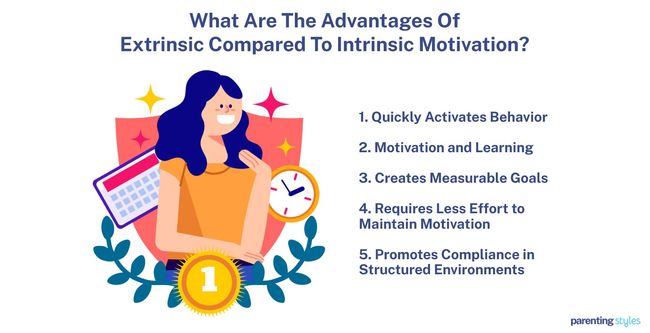
What Are The Similarities Between Intrinsic And Extrinsic Motivation?
The similarities between intrinsic and extrinsic motivation include the common goal of driving behavior. Both types of motivation influence actions, choices, and the intensity of efforts.
Intrinsic and extrinsic motivation are strengthened through specific strategies. Creating an environment that satisfies autonomy, competence, and relatedness increases intrinsic motivation. Extrinsic motivation benefits from clear goal setting, positive reinforcement, and timely rewards.
Both motivations similarly decline over time if not managed effectively. Intrinsic motivation wanes when tasks become repetitive, overly challenging, or undermined with external rewards. For example, a student who initially enjoys solving puzzles loses interest after encountering puzzles with similar or increasingly difficult patterns. Extrinsic motivation diminishes when rewards are perceived as insufficient or unfair, as stated in the 2014 study titled “Reward System and Employees Performance In Lagos State (A Study Of Selected Public Secondary Schools),” conducted by Bello Olaide Wasiu and Adebajo Adeola Adebajo and published in Kuwait Chapter of Arabian Journal of Business and Management Review. For example, an employee who works overtime for a bonus displays less enthusiasm when the reward is less than the invested effort.
Both intrinsic and extrinsic motivation interact with each other. Rewards enhance intrinsic motivation when given during uninteresting tasks, according to a 2001 study titled “Pervasive negative effects of rewards on intrinsic motivation: The myth continues,” conducted by Judy Cameron et al. and published in The Behavior Analyst. Verbal praise strengthens inherent interest during high-interest tasks, while intrinsic motivation reduces when rewards are tangible, offered beforehand, and loosely relevant to the level of performance shown. For example, offering a toy to encourage a child to play may initially capture the child’s interest but the interest to engage eventually diminishes when the toy is no longer provided.
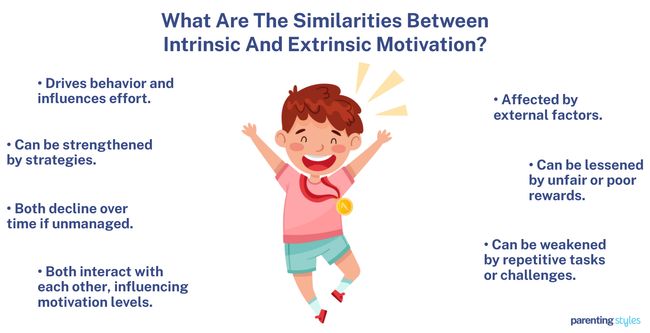
What Are The Differences Between Intrinsic And Extrinsic Motivation?
The differences between intrinsic and extrinsic motivation include their driving force and the longevity of their effects. Intrinsic motivation’s driving force is within an individual. Examples of inherent forces include personal satisfaction, interest, and curiosity. Extrinsic motivation is influenced by factors other than enjoyment or fulfillment.
Intrinsic motivation centers on the process of doing an activity, while extrinsic motivation focuses on the outcome. For example, a student who enjoys learning about history to understand the past is intrinsically motivated. A student who studies history to earn a high grade is extrinsically motivated.
The effects of intrinsic motivation are longer than those of extrinsic motivation. Inherent factors such as curiosity motivate individuals to seek challenges for growth, leading to sustained engagement in the activity, according to a 2011 study titled “Intrinsic Motivation and Positive Development,” conducted by Reed W. Larson and Natalie Rusk and published in Advances in Child Development and Behavior. For example, curiosity about the stars can lead to a career as an astronomer when interest in celestial objects is sustained. The impact of extrinsic motivation is typically short-term, as motivation relies on the continuation of rewards. Receiving awards for astronomy projects motivates a child to study stars, but the interest declines when rewards are removed.
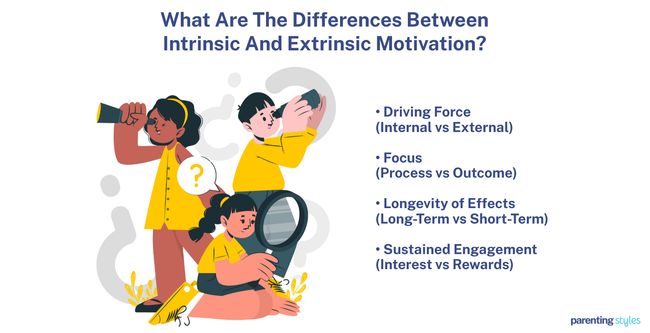
What Are The Best Ways To Motivate A Child?
The best ways to motivate a child include eliciting curiosity, setting realistic goals, believing in the child’s capabilities, setting appropriate levels of challenges, and providing incentives only when necessary. Here are 8 ways to motivate a child.
Elicit Curiosity: Thought-provoking questions and household experiments stimulate a child’s curiosity. Children are motivated to explore and engage in activities when tasks involve hands-on experiences or challenges that ignite imagination and discovery. Opportunities to solve problems and test ideas encourage deeper interest and active participation.
Set Realistic Goals: Intrinsic motivation develops when a child feels confident completing the task. Breaking tasks into smaller, achievable steps helps children feel a sense of progress, resulting in higher motivation to start or complete activities.
Believe in Your Child’s Capabilities: Confidence in the child’s abilities, motivation, and performance increases motivation in school, according to a 2019 study titled “The Role of Parental Beliefs and Practices in Children’s Motivation in a Changing World,” conducted by Marja-Kristiina Lerkkanen and Eija Pakarinen and published in Motivation in Education at a Time of Global Change. A child’s self-concept and self-efficacy increase when parents provide positive expectations for success, increasing motivation and effort to learn.
Provide Incentives Only When Necessary: Overusing incentives undermines the value of effort and responsibility as children associate tasks solely with rewards. Occasional incentives ensure that children value exceptional behaviors while not undermining intrinsic motivation.
Set Appropriate Levels of Challenges: Children are motivated to work toward achievable goals. Tasks that are too simple or difficult often undermine children’s interest, making tasks that gradually increase in difficulty beneficial.
Praise the Process: Effort-focused praise positively affects motivation, while ability-focused praise diminishes enthusiasm, according to a 2020 study titled “Praise affects the “Praiser”: Effects of ability-focused vs. effort-focused praise on motivation,” conducted by Kyosuke Kakinuma et al. in Japan and published in The Journal of Experimental Education. Statements like “”You must have worked hard”” encourage a growth mindset, increasing motivation to continue. In contrast, telling children “”You must be smart”” encourages a fixed mindset, leading to helplessness during setbacks and less motivation to persevere.
Create a Supportive Environment: Allow children to make mistakes and try again. Encouragement and understanding help build confidence and a growth mindset.
Maintain a Good Relationship with Your Child’s Teacher: A strong parent-teacher relationship signals to the child that the teacher is trustworthy, resulting in greater school involvement. Collaboration between parents and teachers to support learning further increases the child’s motivation.